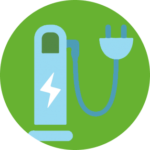Find Incentives for Charging and Vehicles
Ready to save? Tax benefits, grants, vouchers, and rebates! They all help make EV and charger purchases more affordable for people in Maryland.

Vehicle Incentives
Planning on buying an EV? You may qualify for one of these incentives.
Electric Vehicle (EV) and Fuel Cell Electric Vehicle (FCEV) Maryland Tax Credit
Credit Amount: Up to $3,000
Effective Dates: Vehicles must be purchased and titled for the first time between July 1, 2023 and Jun 30, 2027
Eligible Applicants: EV and FCEV purchasers
View incentive details
What is it?
A first-come, first-served excise tax credit for businesses and individuals.
Who Qualifies?
Businesses and individuals who purchase an EV or FCEV.
Eligibility Requirements
- Base purchase price must not exceed $50,000.
- Must be propelled to a significant extent by an electric motor.
- Battery must have at least 4 kilowatt-hours.
- Cannot be modified from original manufacture specifications.
- Must be purchased and titled between July 1, 2023, and June 30, 2027.
- Available for 1 vehicle per individual, and up to 10 vehicles per business entity.
How to Apply
Apply at the Motor Vehicle Administration website.
Helpful Resources
Vehicle Manufacturer Incentives
Many automakers offer exclusive rebates, special financing, or lease deals on electric vehicles. These incentives can often be combined with state and federal programs to maximize your savings. Be sure to check with your local dealer for the latest offers on eligible EV models.
Charging Incentives
Planning on installing an EV charging station? You may qualify for one of these incentives.
Alternative Fuel Infrastructure Federal Tax Credit
Credit Amount: Up to 30% of costs, max $1,000 (residential) or $100,000 (commercial)
Effective Dates: January 1, 2023 – June 30, 2026
Eligible Applicants: Individuals (homeowners), businesses, and tax-exempt entities
View incentive details
What is it?
The Alternative Fuel Vehicle Refueling Property Credit provides a federal tax credit for installing EV charging stations and other alternative fueling infrastructure.
Who Qualifies?
- Homeowners: Receive 30% of the installation cost, up to $1,000.
- Businesses and Tax-Exempt Entities: can receive up to $100,000 per charging unit, depending on labor compliance:
- 6% of costs (standard credit)
- 30% of costs up to $100,000 per unit if installation meets prevailing wage and apprenticeship standards.
Eligibility Requirements
- Charging stations must be installed in eligible low-income or rural areas (check IRS eligibility maps).
- Covers charging equipment, parts, labor costs, and installation expenses.
- Charging infrastructure must be placed into service by June 30, 2026.
How to Apply
- Check if your installation qualifies using the IRS Alternative Fuel Tax Credit Guidance and IRS Location Eligibility Tool.
- File IRS Form 8911 when completing your tax return.
- If applying as a business, ensure compliance with prevailing wage and apprenticeship standards for maximum credit.
Helpful Resources
- IRS Tax Credit Guidance: Alternative Fuel Vehicle Refueling Property Credit
- Check Location Eligibility: IRS Qualified Census Tract Locator
- Claim Your Credit: Download IRS Form 8911
Electric Vehicle Supply Equipment (EVSE) Maryland Rebate Program
Credit Amount: 50% of the costs of acquiring and installing qualified Electric Vehicle Supply Equipment, up to $700 per residential charger or up to $5,000 per commercial charger.
Effective Dates: Determined yearly. Rebates awarded on a first-come, first-served basis
Eligible Applicants: Individuals, businesses, state and local government entities
View incentive details
What is it?
A rebate from the Maryland Energy Administration for the installation of qualified EVSE (Electric Vehicle Supply Equipment).
Who Qualifies?
Individuals, businesses, and government entities.
Eligibility Requirements
Applicants must demonstrate compliance with state, local, and/or federal law that applies to the installation or operation of qualified EV charging stations. Other requirements may apply.
How to Apply
Learn more and apply on the MEA EVSE Rebate Program website.
Helpful Resources
Vehicle Manufacturer Charging Incentives
Some automakers offer charging perks with the purchase or lease of an electric vehicle—like free charging credits, home charger discounts, or complimentary installation. These incentives vary by brand and may be time-limited, so check with your dealer for current offers when shopping for your EV.
